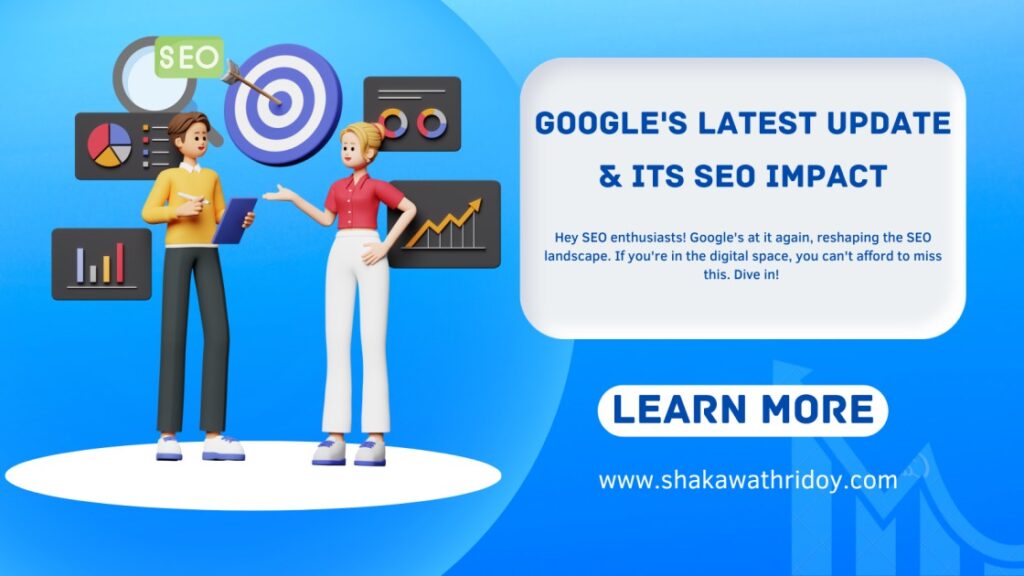The digital landscape is ever-evolving, and at the forefront of this change is Google, the search engine giant. With its latest update, Google has once again demonstrated its commitment to enhancing user experience and search relevance. Let’s delve deep into what this means for SEO professionals and digital marketers.
The Update: Unraveling the Details
Every Google update is a testament to its mission: to provide users with the most relevant and user-friendly results. This recent update is no exception. Here are the key takeaways:
- Page Experience: Gone are the days when just having a website was enough. Now, it’s about the holistic experience a user derives from it. This includes metrics like how fast your page loads, how interactive it is, and how visually stable it remains throughout the user’s interaction.
- Content Quality: While content has always been king, the crown has just gotten heavier. Google now demands content that is not just relevant but also comprehensive, accurate, and authoritative.
- Core Web Vitals: Introduced a while back, these metrics have now become central to Google’s ranking algorithm. They emphasize the importance of user experience on web pages, focusing on aspects like loading performance, interactivity, and visual stability.
Implications for SEO: The New Paradigm
This update has far-reaching implications for the world of SEO. Here’s what it means:
- Mobile-First Indexing: With smartphones becoming ubiquitous, a significant chunk of searches now originates from mobile devices. If your website isn’t optimized for mobile, you’re essentially sidelining a massive portion of your potential audience. This could mean slower load times, difficult navigation, and ultimately, a drop in rankings.
- User Experience (UX) Takes Center Stage: A website that’s hard to navigate or slow to load isn’t just frustrating for users; it’s now a direct threat to your SEO rankings. It’s essential to streamline navigation, enhance page speed, and get rid of disruptive elements like intrusive pop-ups.
- Content Depth and Relevance: It’s not enough to answer a user’s query anymore. Your content needs to dive deep, offering insights, data, and information that isn’t readily available elsewhere. This establishes your authority in your niche and ensures that users don’t just visit but stay and engage with your content.
- E-A-T Becomes Crucial: Expertise, Authoritativeness, and Trustworthiness, or E-A-T, has always been important. But now, it’s paramount. Especially in sensitive niches like health, finance, and news, your brand needs to be seen as a credible, trustworthy source of information.
Navigating the Future: A Roadmap for SEO Professionals
The digital realm is dynamic, but with the right strategies, SEO professionals can not only adapt but thrive. Here’s a roadmap:
- Audit & Adapt: Begin with a thorough audit of your website. Tools like Google’s PageSpeed Insights or Web.dev can offer invaluable insights into where your site stands concerning the core web vitals. Once you have this data, make the necessary tweaks and changes.
- Revamp Your Content Strategy: Content isn’t just about quantity; it’s about quality. Regularly update your existing content to ensure it remains relevant. Dive deep into topics, avoid superficial overviews, and always aim to provide value to your readers.
- Continuous Learning and Upgradation: The only constant in the digital world is change. As professionals, it’s our responsibility to stay updated. Attend webinars, enroll in courses, read industry blogs, and always be on the lookout for the next big shift.
- Engage and Interact: SEO isn’t just about getting users to your site; it’s about keeping them engaged. Encourage interactions, be it through comments, forums, or social media shares. The more engaged your audience, the better your SEO performance.
- Collaborate: The digital space is vast, and no one can be an expert in everything. Collaborate with other professionals, be it content creators, UX designers, or other SEO experts. A collaborative approach can offer fresh perspectives and innovative solutions.
Conclusion
Google’s recent update is a reminder of a fundamental truth in the digital space: prioritize the user, and everything else will follow. As SEO professionals, our goal isn’t just to chase algorithms but to create genuine value, engagement, and trust. By aligning our strategies with this ethos, we’re not just improving our rankings but fostering genuine relationships with our audience.
FAQs
1. What are Core Web Vitals, and why have they gained prominence in the latest Google update?
Answer: Core Web Vitals are a set of metrics introduced by Google to measure the quality of user experience on a webpage. They focus on three main aspects: loading performance (Largest Contentful Paint or LCP), interactivity (First Input Delay or FID), and visual stability (Cumulative Layout Shift or CLS). In the latest update, Google has emphasized these metrics even more, signaling their commitment to ensuring users have a smooth and enjoyable experience on web pages. Websites that perform well on these metrics are likely to rank higher in search results.
2. How does the Mobile-First Indexing impact my website’s SEO?
Answer: Mobile-First Indexing means that Google predominantly uses the mobile version of your website’s content for indexing and ranking. Since the majority of users now access Google Search through mobile devices, websites optimized for mobile are given preference. If your site isn’t mobile-friendly, it could negatively impact your rankings. It’s essential to ensure that your website provides an optimal experience for mobile users, both in terms of design and content accessibility.
3. What is E-A-T, and why is it crucial for certain niches?
Answer: E-A-T stands for Expertise, Authoritativeness, and Trustworthiness. It’s a framework used by Google’s quality raters to evaluate web content. Especially in YMYL (Your Money Your Life) niches like health, finance, and news, the accuracy and credibility of information are paramount. Websites that demonstrate high E-A-T are more likely to rank better because they are seen as reliable sources of information, ensuring users get accurate and trustworthy content.
4. How can I ensure my content aligns with Google’s emphasis on quality and relevance?
Answer: To align with Google’s emphasis, focus on creating in-depth, well-researched content that genuinely answers user queries. Avoid thin or superficial content. Regularly update your content to ensure it remains current and relevant. Incorporate authoritative sources and references to boost credibility. Engage with your audience to understand their needs and tailor your content accordingly. Remember, it’s not just about quantity but the quality and value you provide to your readers.

